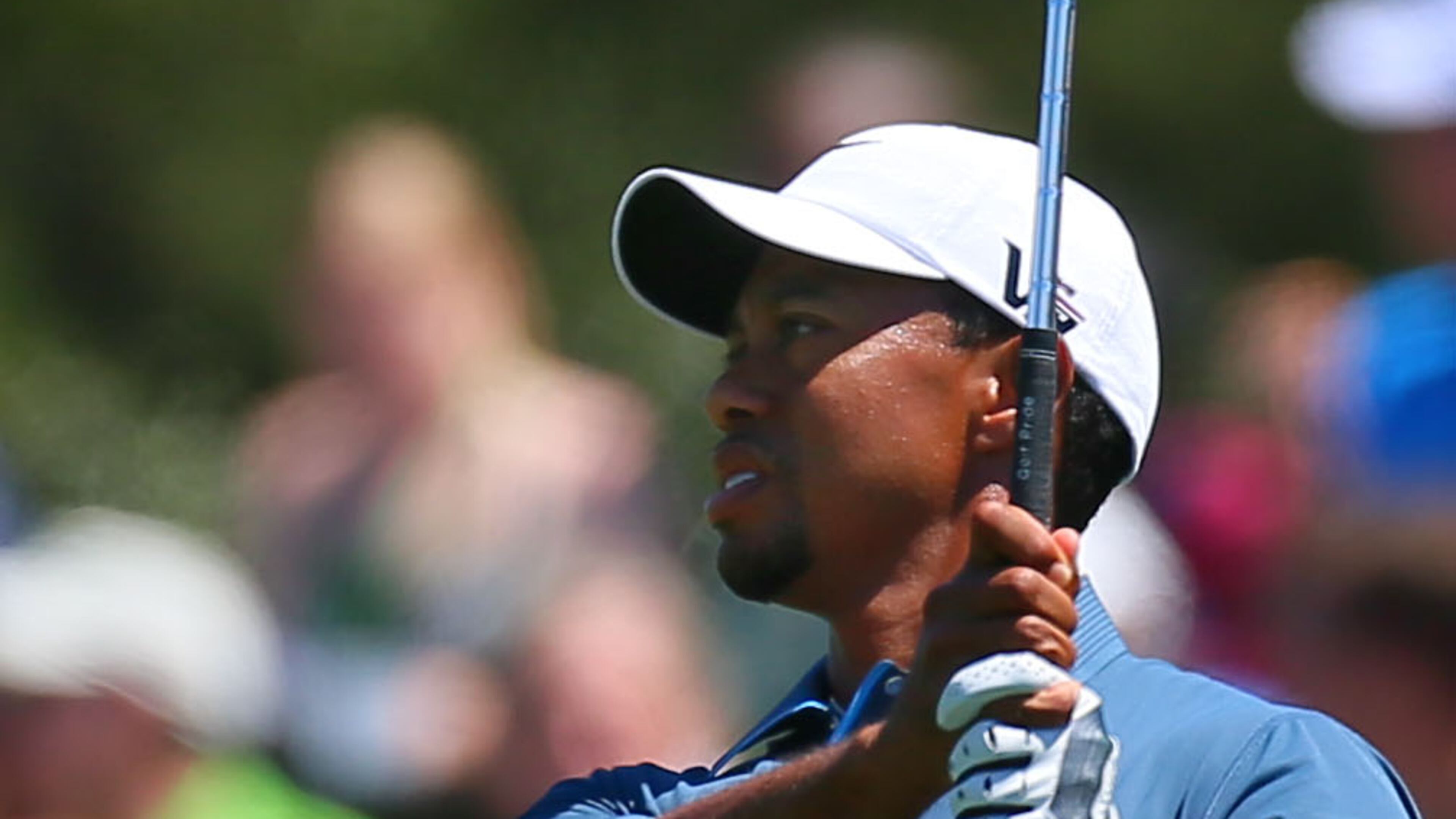Woods explains penalty, focuses on final round

Tiger Woods said he never considered withdrawing from the Masters after he unintentionally broke a rule during Friday’s round, but also acknowledged that if not for a rules change two years ago he likely would have been disqualified.
Wood spent 2 minutes, 15 seconds after Saturday’s third round, in which he shot a 2-under 70 to reach 3 under for the tournament, explaining what happened in one of the more bizarre sequences in golf.
“Under the rules of golf I can play,” Woods said. “I was able to go out there and compete and play.”
During Friday’s second round, on Woods’ third shot to the 15th, a short wedge from 87 yards, the ball hit the flagstick on the fly and bounced backward into the water fronting the green.
Woods had three options for dropping the ball. It appeared he chose to drop nearest to the closest spot where he last hit. Except he chose a spot a few yards away to gain an advantage for what would be his fifth shot. He bogeyed the hole.
“It was pretty obvious I didn’t drop in the right spot,” Woods said Saturday.
A television viewer called in to the rules committee to point out the violation shortly after it happened, and Fred Ridley, chairman of the Masters competition committee, reviewed tape of the shot while Woods was still playing and determined that he did nothing intentionally wrong.
However, in an interview with CBS after his round, Woods acknowledged that his drop might have helped him gain an advantage. Woods said Saturday that he didn’t think about the proper place to drop because he was focused on the competition and still “a little ticked” at hitting the flag.
CBS golf analyst David Feherty made the public aware Friday night that he thought Woods may have made an incorrect drop, sparking numerous opinions. CBS announcer Jim Nantz called Ridley around 10 p.m. Friday night to point out Woods’ comment. Ridley called Woods’ agent, Leigh Steinberg, requesting a Saturday morning meeting to review Woods’ action.
Woods said he wasn’t aware that “drop-gate” was brewing until he woke Saturday morning to a text from his agent asking him to call. Woods was scheduled to tee off at 1:45 p.m.
“I didn’t know what was going on,” Woods said.
Woods met with Ridley at the Augusta National at 8 a.m. Saturday. After listening to Woods’ explanation, Ridley determined that Woods had unintentionally violated the rules. However, Ridley already had handcuffed himself by determining that Woods hadn’t broken the rules. Ridley said he never considered disqualifying Woods. Instead he chose to penalize him two strokes, which would also have been the penalty for not placing the ball in the correct spot and then hitting it from the incorrect spot.
“I didn’t see anything, and he didn’t tell me anything that would lead me to believe that he knowingly violated the rule,” Ridley said during a meeting with reporters Saturday afternoon. Ridley implied that he made the USGA and R&A, golf’s rulesmakers, aware of their decision and that they agreed with the ruling.
Woods was spared by rule 33-7, nicknamed the Harrington Rule, named after Padraig Harrington and put into place in 2011. The rule gives a tournament organizer the discretion to waive disqualification in certain cases. It was put into place after Harrington was disqualified for signing an incorrect scorecard during a tournament in Abu Dhabi. A viewer watching on a hi-definition TV spotted that Harrington had caused his ball to barely move on the green and called in the violation to rules officials.
After their rounds, various players said they didn’t think Woods intentionally violated any of golf’s rules, and they could understand how the mistake was made.
“(The drop) is a very basic rule that all the golfers in the Masters know,” Duluth’s Stewart Cink said. “But when you get in the intensity of the Masters and there’s a lot going on … things don’t go right in the mind. I think that’s what the case was. Obviously there’s no intention. He just made a little bit of a mistake in error. They gave him a nice break.”
Various analysts, including Brandel Chamblee and three-time Masters Nick Faldo, weren’t as understanding. Both said Woods should have disqualified himself from the tournament. Faldo later said on the air on CBS that the golfers from his generation were going to have to understand that the rules have changed.
Woods brushed off a question about those comments with his comments that under the rules he can play.
“If it was done year or two I wouldn’t have the opportunity,” he said. “The rules have changed, and under the rules of golf I can play.”
He said the day off started off a little differently than usual, but he was able to regain his focus after going to gym.
Standing just outside Augusta’s clubhouse, Wood seemed focused on the task at hand, pointing out that he’s in position to win his fifth green jacket and first since 2005. Just like the theme of his recent commercial, victory seems to be all he’s focused on.
“I’m right there in the ballgame with a great shot at winning this championship,” he said.


